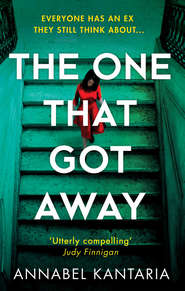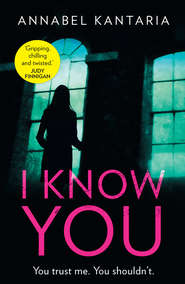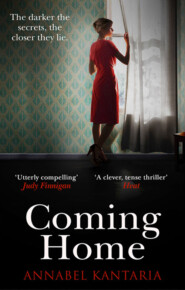По всем вопросам обращайтесь на: info@litportal.ru
(©) 2003-2025.
✖
The Disappearance
Автор
Год написания книги
2018
Настройки чтения
Размер шрифта
Высота строк
Поля
‘Yes, you, Lexi. I can’t stay with her any more. I’ve done my bit. The twins are at a swimming gala this afternoon and Anastasia will kill me if I’m not there.’ John pronounced his wife’s name with a long ‘a’ and a soft ‘s’, emphasis on the middle syllable: Anna-star-seeya. Never ‘Anna-stay-zia’. It still blew my mind that my rather unemotional and unspontaneous brother had come back from a holiday to Estonia not just with a beautiful wife and two ready-made children, but with his new mother-in-law, too.
‘But …’ I thought about the call I was waiting for from the doctor. I had a mountain of marking to do and all I really wanted to do was curl up on the sofa and nurture the life I was convinced was growing inside me, not drive down to St Ives in the pouring rain and play nursemaid to Mum.
‘Please can you do it, John?’ A sob caught in my throat. ‘Please?’
John sighed. ‘I’m asking you nicely, Lexi. But it really is your turn.’ There was a silence. ‘Look. Isn’t this why you moved to Cornwall? So you could help out a bit, too?’ The implication was there: until Mark and I had moved to Truro six months ago, John had borne the brunt of looking after Mum while I ‘ignored my responsibilities’ – John’s words – up in London.
Knowing he had the moral high ground, John continued almost seamlessly. ‘How quickly can you be there? I dropped her off just now, so the sooner, the better, really.’
‘You left her alone? Fantastic.’ I slammed the brakes on as a car pulled out in front of me.
‘I had to go, Lexi,’ John said, his voice slow and deliberate. ‘I have a family, remember? I’ve already spent half the night with her at the hospital. And then I scrapped our plans for the morning. I sorted out the insurance. I organised her car to be picked up, I took her home from the hospital and now I’ve made her comfortable. She’s not very chatty – she’s on the sofa, looking a bit dazed. I left her with a crossword. She’ll be fine until you get there.’
Silence hung heavy on the line. A silence in which I realised that I had no choice. I indicated and turned into my road, the car’s tyres swishing through puddles.
‘Are you driving?’ John asked.
‘Yes.’
‘Oh. You can call me back when you get in, if you want.’
‘No it’s okay. Hands-free.’ I paused. ‘Okay, I’ll come down.’
‘Thanks.’
I pulled into a rare parking space right outside my house, sending a silent thank you to the gods as I did so.
‘By the way,’ said John. ‘While you’re there, can you observe her a bit? I mean, more than usual? I thought she was acting a bit odd, like she wasn’t all there. She was just sitting there this morning, staring into the distance. It’s like she’s in a different world. I’m worried the hospital might have missed something. You know – with the bang on the head.’
‘Sure. But I can’t go for an hour or two. I need to speak to Mark and he’s not due back for a bit.’
‘Okay,’ said John. ‘Thanks, Lexi. Bye.’ The line disconnected and my phone buzzed at once: a missed call from the doctor’s number, followed by the beep of a text message asking me to call. I dialled in.
‘Mrs Scrivener,’ the doctor said when my call was put through. I heard papers rustling; imagined her looking for my test results. ‘How are you feeling?’
‘Fine, thank you,’ I said. ‘A bit tired.’
‘Okay. Well, the results of your blood test are back.’ She paused.
‘And?’ I said.
‘Your hCG level is very low.’
‘What does that mean? Am I pregnant?’
The doctor sighed. ‘Well. It’s really too low for a healthy pregnancy.’
‘What do you mean? I might not be? The test I did at home was positive. I did two really sensitive tests! Both were positive!’
The doctor’s blood test was supposed to be a rubber-stamp of news I already knew. How could it not be certain when the over-the-counter test had been?
The doctor sighed. ‘It’s possible that something started and is now failing. A lot of pregnancies fail very early on, before many women even suspect they might have been pregnant. Sometimes, testing very early can backfire …’ Her voice was gentle. She paused and I didn’t say anything.
I’d been so certain. I’d even felt faintly sick this morning. I thought about the tiny babygros I’d just been stroking in the supermarket just now; the white Moses basket I’d picked out online. White because, although I hoped for a girl, I didn’t want to know the sex.
‘I’m very sorry,’ said the doctor.
‘I … just … I wasn’t expecting this.’
‘I know. It’s very common, though. More common than you’d think.’
‘Is there anything I can do? To increase my chances next month?’
‘Just be kind to yourself. Eat well, exercise. Get enough sleep. Take it easy and try not to worry.’
Try not to worry! ‘Okay,’ I said. ‘Thank you.’
I pressed disconnect and let my forehead slump onto the steering wheel as I wrapped my arms around myself. I’d been so sure this time! How could I not be pregnant? Even though it was very early days, I’d felt all the classic symptoms. The last thing I felt like now was driving down to St Ives to look after Mum. As soon as I’d thought it, guilt washed over me. John had done his bit and I’d still expected him to do more. But that guilt was nothing compared to the guilt I felt about the pregnancy. Why couldn’t I give Mark a baby? What was wrong with me?
Deep down, I knew the answer: at forty-two, time was hardly on my side.
January 1971 (#ulink_4bda9262-54d9-53e3-ad4c-ab68139fdecf)
Bombay, India (#ulink_4bda9262-54d9-53e3-ad4c-ab68139fdecf)
When Audrey wakes up, the first thing she notices is the stillness. The small room in which she’s lying in a tangle of sweaty sheets isn’t by any means silent – the din of Bombay is alive right outside the window – but the absence of the rumble of the ship’s engine rings louder than it ever did on the ship. A week after she’s arrived, Audrey’s still acclimatising to being on land. Truth be told, she’s slightly terrified of Bombay and has hardly ventured out unless Janet’s there, literally to hold her hand, to guide her across the streets, to fend off the beggars and street hawkers that swarm around them, and to flag down rickshaws the two of them use to get anywhere too far to walk.
But today Audrey has a plan. Today is the first day she’s going to take on this strange city alone; to conquer a corner of it. On the small table that counts both as Janet’s dressing and dining table, there’s a copy of Audrey’s parents’ wedding certificate, which names the small church in which they were married. Janet’s asked around for her at work, and Audrey now has a hand-drawn map showing her how to find it. For the first time since she’s arrived in Bombay she gets up with a purpose in her step. She washes quickly and dresses, makes some toast, and steps out into the chaotic street, where the warmth of the January air hits her.
Audrey stands still for a second, feasting her eyes on the dusty palm trees that look so exotic to her, their heavy fronds dancing likes drunken spiders in the breeze. This is home now, she thinks, even while her senses revel in everything that’s unfamiliar: the smells, the furious honks of car horns and the shouts in Hindi, Marathi, and a tangle of other languages – a gabble of sound she’s unable to decipher.
Audrey’s memorised where she needs to go – it’s not far – and she walks as quickly as she can, trying, but not always managing, to stick to pavements while avoiding pedestrians, traffic, and holes in the road. Ahead of her there’s a commotion and she sees the traffic’s come to a halt as a couple of cows amble about in the middle of the road. Janet’s explained to her that this is perfectly normal, and it’s exactly how she imagined Bombay would be, but she still can’t believe her eyes. Someone’s trying to lead the cows off the street so traffic can pass, but no one except her seems to bat an eyelid at the strange juxtaposition of cows, cars, bicycles, and bullock carts that makes up this pungent traffic jam. As Audrey watches, one of the cows lifts its tail and deposits a steaming cowpat in the middle of the road. Audrey turns down a side street just before the smell hits her.
At first she doesn’t see the church. It’s not big, and it doesn’t stand out from the dirty buildings surrounding it. She double-checks her map, then stands back on the other side of the street and scans the facades to be sure she’s in the right place before she goes in. Yes, it looks nothing like the churches she’s used to back home, but there’s a steeple peeping out from behind a dusty tree. It’s definitely the church. Audrey takes a deep breath, closes her eyes, and imagines her mum arriving for her wedding, picking her way down the street in her finery knowing her groom was waiting inside the church. Holding the image in her head, she pushes open the heavy wooden door and enters.
It takes a minute for Audrey’s eyes to become accustomed to the gloom of the interior after the bright sunshine outside so she stands still, taking in the sparse wooden pews – perhaps only seven or eight rows – and the small altar at the front. Dust motes dance in the sunbeams that penetrate the stained glass windows. When her eyes have adjusted, Audrey walks slowly down the aisle, picturing her mum doing the same on her wedding day, a small posy of garden flowers clasped at her chest. At the altar she stops, closes her eyes, and stands in silence, feeling the moment.
‘Can I help you?’ A woman’s voice cuts in and Audrey’s eyes snap open. She spins around.
‘Oh, hello,’ she says. ‘I hope you don’t mind … I … I think my parents were married in this church and I just wanted to come and see it.’
‘Lovely! Welcome.’ The woman waves her hand at the church’s interior. ‘Please stay as long as you like. When was the wedding? I could possibly dig out the record for you.’
‘Oh, could you? That would be fantastic! They were married in 1940.’
The woman looks thoughtful. ‘Yes. I’m sure we have those records. I’d need a day or so to find it but I could definitely get it out for you. Do you know which month?’
‘Yes – June.’








